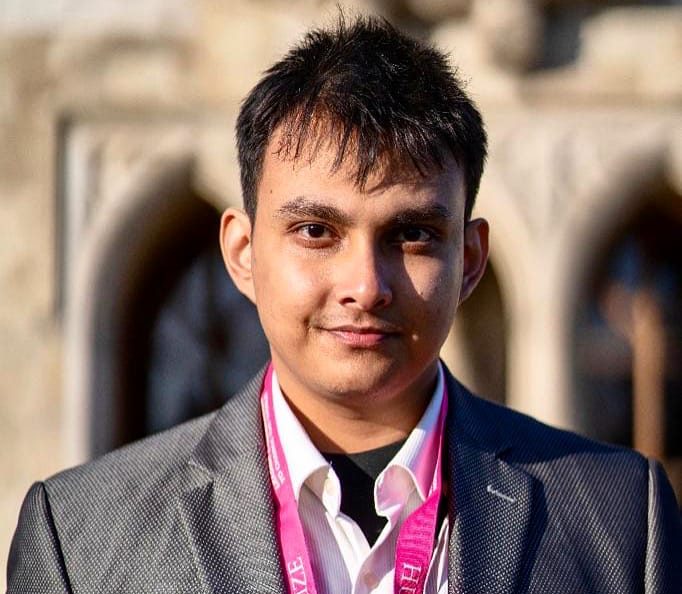Women at the Heart of Disaster Resilience

Women Most at Risk
In Bangladesh, women and children remain the most vulnerable groups during disasters. Cyclone Remal in 2024 highlighted this harsh reality. A UN report found that women often evacuate late due to social norms and family care responsibilities. Overcrowded shelters without privacy or proper sanitation increased their exposure to fear, insecurity, and gender-based violence. The report emphasized that empowering women is crucial to mitigating disaster risks.
Launch of a New Project
To address these challenges, BRAC and UN Women, with financial support from the Swedish International Development Cooperation Agency (Sida), launched the Gender-Responsive Disaster Risk Reduction in Bangladesh (GRDRRIB) project. The inception workshop was held on September 2, 2025, at the Pan Pacific Sonargaon Hotel, Dhaka.
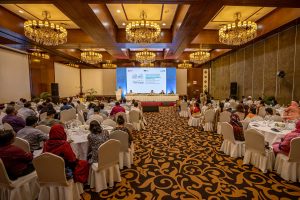
Guests at the Event
The event was attended by:
- K M Abdul Wadud, Additional Secretary, Ministry of Disaster Management and Relief (Chief Guest)
- Navanita Sinha, Deputy Country Representative, UN Women Bangladesh
- Matilda Svensson, First Secretary, Embassy of Sweden in Dhaka
- Kazi Golam Towsif, Director General, Department of Women’s Affairs
- Rezwanur Rahman, Director General, Department of Disaster Management
The workshop was chaired by Dr. Md Liakath Ali, Director of BRAC’s Disaster Risk Management, Climate Change, and Urban Development Programmes.
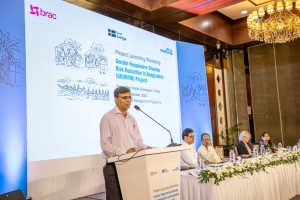
Goals of the Project
The GRDRRIB project aims to:
- Strengthen national and local institutions and civil society
- Ensure the protection of women and girls during disasters
- Promote women’s leadership in disaster preparedness, response, and recovery
- Integrate gender perspectives into disaster risk reduction (DRR) policies and practices
The overall objective is to reduce vulnerabilities, promote equitable disaster management, and build a more resilient Bangladesh.
Key Messages from Speakers
- K M Abdul Wadud noted that while disaster-related deaths have decreased, economic losses remain high. He stressed the need for stronger preparedness, early warning systems, disaster risk insurance, and adequate funding.
- Navanita Sinha said Bangladesh is globally recognized for resilience and has a strong political commitment to gender-inclusive disaster response. However, women’s frontline leadership must be further strengthened.
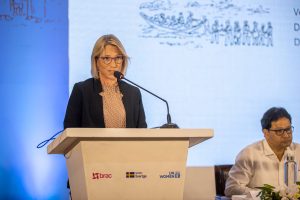
- Matilda Svensson emphasized that gender equality is essential for resilience, not optional. She called for financing women-led initiatives and ensuring gender data informs disaster planning.
- Kazi Golam Towsif noted that, since women comprise a significant portion of the population, their leadership in disaster management needs to be developed.
- Rezwanur Rahman stressed that women, children, the elderly, and people with disabilities must be prioritized, with representation ensured in disaster planning.
Closing Remarks
Dr. Liakath Ali emphasized the importance of incorporating climate projections and local knowledge into all projects. He assured that stakeholder feedback will guide the implementation of GRDRRIB and emphasized the goal of helping communities “build back better.”
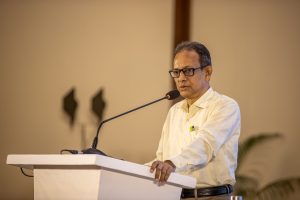
Project Timeline and Coverage
The GRDRRIB project will run from August 2025 to December 2026 in 12 disaster-prone districts: Kurigram, Jamalpur, Sunamganj, Sylhet, Cumilla, Noakhali, Feni, Bhola, Chattogram, Sirajganj, Khulna, and Satkhira.
It will focus on developing a gender-responsive National Plan for Disaster Management, building the capacity of officials and community actors, and strengthening coordination platforms such as the Gender in Humanitarian Action (GiHA) Working Group.
Workshop Participants
The inception workshop brought together representatives from government ministries, development partners, civil society, academia, and the media to share insights and build partnerships for the project’s success.



